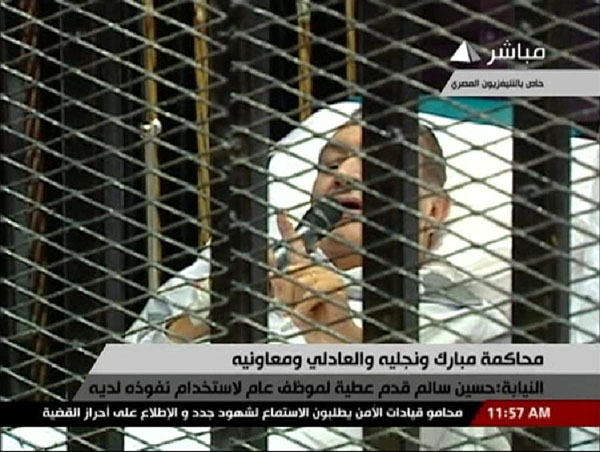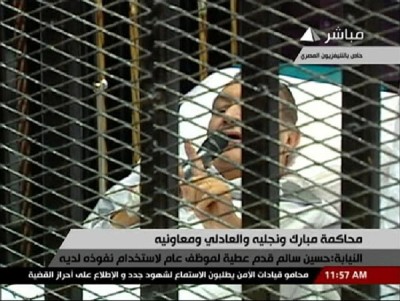CAIRO, Aug. 3 (Xinhua) — Egypt’s former President Hosni Mubarak appeared in court in Cairo on Wednesday in the first session of his trial along with ten other defendants.
He became the first president to stand trial in the history of Egypt and also the first ever since the mass protests began to sweep the Middle East.
Mubarak was transferred to Cairo early Wednesday morning from a hospital in Sharm el-Sheikh. His two sons, Alaa and Gamal, ex- interior minister Habib Adli and six police officers also stood trial, who were in a large iron cage at the same court in the Police Academy. Meanwhile, Hussein Salem, a businessman close to the former regime was tried in absentia.
The venue, ironically, had been named after Mubarak, but his name has been removed after he was forced to resign in February after 18 days of anti-government protests.
The court opened at around 10 a.m. (0800 GMT) and ended at 2 p. m. (1200 GMT) with two breaks. The whole session was broadcast live on state TV. Some 3,000 soldiers and police and 20 armed vehicles were deployed around the venue.
Mubarak lay in bed in the cage, looking rather conscious and listening to what the judges and lawyers said. His two sons stood by him and talked with him from time to time.
Mubarak, his sons and his aides were accused of killing protesters during the Jan. 25 to Feb. 11 protests, which left 846 dead and more than 6,000 injured according to a report of government-backed fact-finding committee. The prosecutors also accused Mubarak and his sons of accepting bribes from the second suspect, runaway businessman Hussein Salem.
The Mubarak family had accepted five villas and their surroundings worth of 39.7 million Egyptian pounds ( about 6.7 million U.S. dollars) from Salem, who in return got allocation orders of two million square meters of lands in Sharm el-Sheikh.
Mubarak was also charged with cooperating with former minister of petroleum Sameh Fahmi to export gas to Israel at price below market levels through a company Salem owned a majority share.
But Mubarak and his two sons denied all the charges against them.
“I entirely deny all those accusations,” said Mubarak, holding a microphone.
Mubarak’s lawyer asked for a permission of photocopying the 43- page document which questioned the former president, as well as the testimony of those who were in power when the nationwide demonstrations broke out, including chief of the ruling Supreme Council of the Armed Forces Hussein Tantawi.
The next session for Mubarak and his two sons will open on Aug. 15. Adli and his six assistants will continue their trial on Thursday.
Ahead of the trial, clashes occurred outside the trial venue between Mubarak’s supporters and opponents who threw rocks at each other. Dozens were injured.
Police have put barriers to separate the two groups, trying to calm down the crowds after the trial began.
The court decided to put Mubarak at the international hospital complex in Ismailia desert road, not far from the Police Academy.
Mubarak’s trial came after continuous protests across the country since early July to demand faster reforms. Egyptian citizens harbored mixed feelings about the trial of the 83-year- old man.
“I am very sad. I am happy with the revolution fruits but I don ‘t wish Mubarak be tried,” said Engy Ammar, a 23-year-old lawyer.” At any case, he was our country’s symbol and we shouldn’t insult him this way … Toppling him from his chair is enough.”
However, political parties and youths supported the trial.
Essam el-Eryan, deputy president of the Freedom and Justice Party affiliated to the Muslim Brotherhood, said that “Mubarak’s trial is the trial of the century, a lesson for all presidential candidates, who might think they can deviate from the democratic and justice without punishment.”
“Seeing Mubarak in the cage on TV today is the best thing I have ever seen. He killed protestors and stole our money,” Ahmed Salah, a 28-year-old subway employer, told Xinhua.
“Concerning Adli, We won’t accept any decisions but his execution because of all the violations happened in the police station,” he added.
Mohmmed Hassan, 33, told Xinhua that “the trial of Mubarak is appeasing the public and there shouldn’t be any further protests. People have to trust the Egyptian justice and give them a fair chance to work.”
“Mubarak’s trial is the most important event in Egypt’s history, as it is the first time not only in Egypt but in the Middle East to try a military ruler in a civil trial,” said Ibrahim el-Nagar, a researcher with the Al-Ahram Center for Political and Strategic Studies.
“The trial will not only affect Egypt’s history but also Egypt’ s future, it is a lesson for the coming president. The president is a normal employer in a country to serve his citizens,” Nagar told Xinhua.
According to Nagar, Mubarak’s trial may also press other rulers currently encountering crisis in the region to reconsider how to avoid the same fate.























